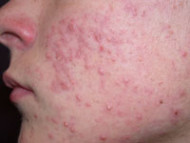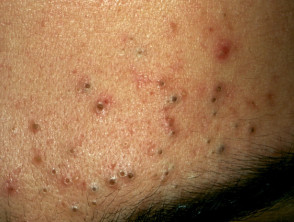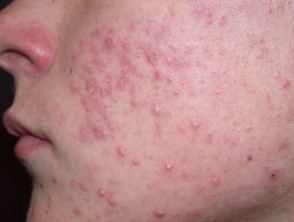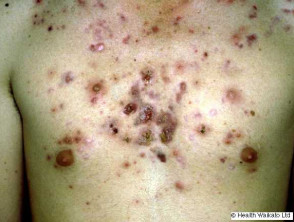What is acne?
Acne is a common chronic disorder affecting the hair follicle and sebaceous gland, in which there is expansion and blockage of the follicle and inflammation. There are several variants.
Who gets acne?
Acne affects males and females of all races and ethnicities. It is prevalent in adolescents and young adults, with 85% of 16 to 18 year-olds affected. However, it may sometimes occur in children and adults of all ages.
What causes acne?
Acne is due to a combination of factors. The exact mechanisms are not fully understood.
- Familial tendency
- Endogenous and exogenous androgenic hormones
- Acne bacteria
- Innate immune activation with inflammatory mediators
- Distension and occlusion of the hair follicles
Flares of acne can be provoked by:
- Polycystic ovarian disease
- Drugs: steroids, hormones, anticonvulsants, epidermal growth factor receptor inhibitors and others
- Application of occlusive cosmetics
- High environmental humidity
- Diet high in dairy products and high glycaemic foods.
What are the clinical features of acne?
Acne is often confined to the face but it may involve the neck, chest, and back.
It is characterised by:
- Open and closed uninflamed comedones (blackheads and whiteheads)
- Inflamed papules and pustules
- In severe acne, nodules and pseudocysts
- Post-inflammatory erythematous or pigmented macules and scars
- Adverse social and psychological effects.
Severity is classified as mild, moderate, or severe.
- Mild acne: total lesion count <30
- Moderate acne: total lesion count 30–125
- Severe acne: total lesion count >125
What tests are necessary for acne?
In most cases, tests are unnecessary. If features are atypical consider:
- Skin swabs for microscopy and culture
- Hormonal tests in females.
Acne
See more images of acne:
What is the treatment for acne?
Mild acne
- Topical anti-acne agents, such as benzoyl peroxide, azelaic acid, and tretinoin or adapalene gel. New bioactive proteins may also prove successful.
- Low-dose combined oral contraceptive
- Antiseptic or keratolytic washes containing salicylic acid
- Light/laser therapy
Moderate acne
- As for mild acne plus a tetracycline such as doxycycline 50–200 mg daily for 6 months or so
- Erythromycin or trimethoprim if doxycycline intolerant
- Antiandrogen therapy with long-term cyproterone acetate + ethinylestradiol or spironolactone may be considered in women not responding to low-dose combined oral contraceptive, particularly for women with polycystic ovaries
- Isotretinoin is often used if acne is persistent or treatment-resistant
Severe acne
- Referral to a dermatologist
- If fever, arthralgia, bone pain, ulcerated or extensive skin lesions, blood count should be arranged and referral is urgent
- Oral antibiotics are often used in higher doses than normal
- Oral isotretinoin is usually recommended in suitable patients
What is the outlook for acne?
- Acne tends to improve after the age of 25 years but may persist, especially in females.
Treatment with isotretinoin can lead to long-term remission in many patients.



